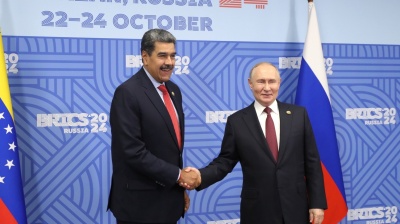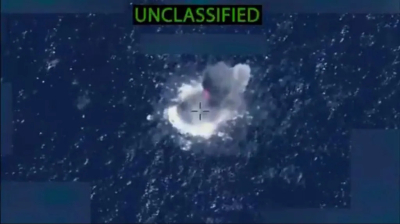The Trump administration has drawn up a list of potential military targets within Venezuela as part of its intensifying pressure on President Nicolás Maduro, who has turned to Moscow seeking urgent military assistance, US officials have disclosed.
Pentagon planners are examining facilities including harbours, landing strips and naval installations that Washington alleges serve dual purposes – ostensibly military whilst facilitating cocaine shipments, according to officials who spoke to the Wall Street Journal. Whilst no final authorisation has been given for such operations, they would bring the conflict directly onto Venezuelan soil after a barrage of strikes against vessels the White House claims were carrying drugs.
Meanwhile, Maduro has appealed directly to Russian President Vladimir Putin for help strengthening Venezuela's air defences, including delivery of 14 missile units and restoration of Russian-made Sukhoi Su-30MK2 fighter aircraft, the Washington Post reported on October 31, citing internal US government documents.
The embattled Venezuelan leader's written plea was delivered by Transportation Minister Ramón Celestino Velásquez during a mid-October visit to Moscow, where he met with his Russian counterpart, according to the documents. The missive characterised the Su-30 jets as "the most important deterrent the Venezuelan National Government had when facing the threat of war," the Post reported.
Maduro also sought engine overhauls, radar repairs and unspecified logistical support, alongside a three-year financing arrangement through Russian state defence conglomerate Rostec, though no amount was specified. The Kremlin’s response, if any, is not known.
The Pentagon's decision to position the USS Gerald R. Ford carrier group in Caribbean waters significantly expands Washington's military options in the region. The deployment adds thousands of additional personnel and dozens of combat aircraft to a force that already numbers more than 10,000 troops.
A White House spokeswoman said Trump had made clear his expectation that Caracas cease "sending drugs and criminals" to America, adding that the president stood ready to employ "every element of American power" to halt narcotics flows.
The administration has long sought to frame Maduro's regime as fundamentally a criminal enterprise focused on drug trafficking. Secretary of State Marco Rubio has characterised Venezuela as controlled by what he terms narcoterrorists, though independent analysts note the country does not produce fentanyl, the synthetic opioid responsible for most American overdose fatalities, and only serves as a secondary waypoint for Colombian cocaine moving northward.
Maduro, who is not recognised as a legitimate leader by the US and many countries in the region following July 2024's disputed presidential election, has rejected Washington's allegations, claiming the actions against his country are intended to "justify a war, regime change, and the theft of Venezuela's immense oil and gas wealth."
Washington nearly doubled its reward for information leading to Maduro's arrest to $50mn in August, whilst also offering substantial bounties for senior officials including the interior and defence ministers, both of whom face American drug trafficking indictments.
On October 31, the Miami Herald reported that strikes might occur imminently, though the White House subsequently pushed back against such claims. Trump himself denied having reached a decision when questioned by reporters, whilst Rubio directly dismissed the Herald's account.
Despite official denials, American bomber aircraft have conducted multiple flights near Venezuelan airspace in recent weeks, operations that defence analysts interpret as reconnaissance missions to assess the country's air defence capabilities. For its part, Caracas has boasted its possession of 5,000 Russian-manufactured Igla-S surface-to-air missile systems, including thousands of portable launchers.
However, Moscow – absorbed in its war in Ukraine and cultivating closer relationships with other regional partners such as Nicaragua – would have limited capacity or inclination to provide significant assistance should Washington launch a comprehensive operation inside Venezuela, analysts say. Additionally, Trump's military focus on the Caribbean may paradoxically benefit Putin by diverting attention from Ukraine.
“The fact that we’ve moved over 10% of our naval assets to the Caribbean is already a win, in some regards, for Putin,” James Story, a former US ambassador to Venezuela, told the Washington Post. “Our renewed interest in all things Western Hemisphere divides our attention on Ukraine. And that’s a good thing for Putin.”
The strategic calculus behind the pressure campaign appears aimed more at fracturing support for Maduro within Venezuela's military establishment than mounting a full-scale invasion. Last week, Republican Senator Rick Scott publicly suggested the Venezuelan autocrat consider departing for Russia or China, though he expressed doubt Washington would pursue such an operation.
Yet Venezuela's armed forces have shown no signs of wavering, and Maduro's government has mobilised coastal defences whilst accusing Washington of plotting regime change.
Some analysts question whether Maduro's circle has any incentive to peacefully surrender power given the American criminal charges they face.
The aggressive approach, which began in August, marks a departure from earlier diplomatic overtures and sanction relief measures. It has been championed by Rubio, who views Maduro's removal as integral to ending communist rule in Cuba. So far, Moscow and Beijing have provided mere diplomatic backing to Caracas. Putin signed a strategic partnership treaty with Venezuela earlier this year, though it contained no explicit military commitments.
Russia's track record with allied strongmen offers little reassurance: former Syrian dictator Bashar al-Assad received negligible Kremlin help when overthrown last December, ultimately fleeing to a relatively safe Moscow exile.
Beijing's support appears equally constrained despite Maduro's public displays of Chinese solidarity. "China is not willing to do a lot to keep Maduro in power," Francisco Monaldi, director of the Latin America Energy Program at Rice University, previously told bne Intellinews. Whilst Beijing has extended tens of billions in development loans to Caracas over the past two decades, Chinese foreign direct investment turned negative in 2019, and commercial banks have virtually abandoned the country.
According to Monaldi, Chinese officials have quietly opened channels to Venezuela's opposition, hedging against a post-Maduro scenario, whilst Beijing's oil investments have largely shifted to neighbouring Guyana – placing Chinese interests directly at odds with Venezuela's territorial claims over the Essequibo region.
News

Ukraine’s elite HUR forces turn the tide in the battle for Pokrovsk, as Russia’s effort to capture key logistics hub fails
The battle for Pokrovsk became intense early on November 1and it looked like the fall of the key logistics hub to Russia was imminent. But a bold counterattack by Ukraine’s elite HUR forces seems to have turned the tide.

Bulgaria suspends fuel exports to EU after US sanctions Lukoil
Bulgaria has temporarily suspended exports of petroleum products to European Union countries after the United States imposed sanctions on Russian oil giant Lukoil.

Tens of thousands rally in Serbia's Novi Sad one year after deadly station collapse
Tragedy that killed 16 people has become a symbol of public anger over corruption and negligence, fueling Serbia’s largest protest movement in more than a decade.

US push to pressure Iran providing fresh incentive for trans-Caspian pipeline
Turkmenistan showing interest in the idea.




